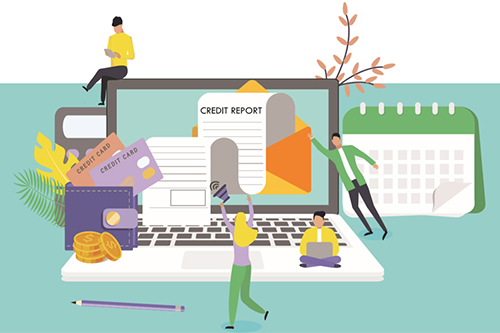Last Updated on October 24, 2023 by CREW Editorial
Excitement and uncertainty go hand-in-hand for anyone looking to purchase a property, especially first-time buyers. For many, there’s a sizeable learning curve to overcome in understanding how the home-buying process works. A crucial early step is knowing what your credit score is and the outsized role it plays.
Generally, credit scores range on a scale from 300 to 900. Scores over 660 are considered good by most lenders, who closely examine your credit score, along with other information such as your income, to determine your risk worthiness before approving a home loan. Your credit score is largely based on your history of making bill payments on time, the amount of debt you have, your mix of credit accounts and any negative information in your name from lenders and creditors concerning missed or outstanding payments that may be lingering on your credit report.
How do you establish good credit?
It’s a situation many young adults face when they’re just starting out – how to build a credit history when you don’t have a credit history. After all, you can’t show that you’ve demonstrated responsible credit behaviour when a lack of credit history means you can’t get a loan or a credit card.
Some people also have the misconception that they’ll be an excellent candidate to receive credit or a loan because they’ve never had a credit card and therefore carry no debt. The truth is it’s not actually beneficial to stay on the sidelines.
The good news is there are a number of ways you can establish responsible credit behaviour.
Consider applying for a secured or student credit card
A secured credit card requires making a deposit upfront, possibly the same amount as your credit limit. You can use secured credit cards just like an unsecured credit card to make purchases and regular payments. If you fail to pay off the balance of a secured credit card each month, it will incur interest. When you close the account, you receive your deposit back.
Because a secured credit card is meant to help you establish a credit history, it’s not intended for long-term use. It’s important to make sure your secured credit card company reports to the two major credit bureaus – Equifax and TransUnion – to ensure your credit files will reflect your responsible credit behaviour. It’s also important to make sure it’s a secured card versus a prepaid card, which is a type of card you can purchase to use essentially like a generic gift card. The activity on these prepaid cards is not reported to the credit bureaus.
If you’re a student, some credit card issuers also offer student credit cards, which are designed to help students build credit. You usually have to be a student to qualify, and student card issuers require applicants to provide school information. If you’re not a student, several large banks and credit card companies offer cards with low credit limits to consumers building their credit. Some require an annual fee.
The most important thing when holding any type of credit card is to try to make the payment on time and in full each month. This is the best way to establish a positive credit history. If you can’t make the full payment, pay as much as you can or at least the minimum amount owed. Having a history of missed or late payments can hurt your credit score and may lead to you not being approved for a mortgage.
Consider becoming an authorized user on a credit card
As an authorized user on someone else’s credit card account, you’ll receive a credit card in your name, linked to the primary cardholder’s account.
Authorized users aren’t responsible for payment on the account, but how the primary account holder pays the account may be reflected in your credit history. It’s important to know who you’re becoming an authorized user with and whether they have responsible payment behaviour. Missed or late payments on the account can be reflected on the credit files of both individuals – potentially impacting both parties’ credit scores.
Before you become an authorized user, you (or the primary account holder) may want to consider contacting the credit card issuer to determine if they report information about authorized users to the two credit bureaus. If not, the account won’t help build your credit history.
Get a co-signer
A co-signer is a person who agrees to be legally responsible to pay a debt if the borrower doesn’t pay back a loan as agreed. One common scenario is for parents to co-sign on their child’s car or student loan. Benefits of getting a co-signer may include better loan terms or being able to qualify for a loan you might not otherwise get. However, this is not an agreement to enter into lightly. Failing to make payments on the loan can impact both you and your co-signer.
If you know your credit score is low, you should take the time to establish good credit behaviour before going to see a mortgage lender. A spotty credit history isn’t a good recipe for success to receive funding for what may be the largest purchase you’ll ever make. In some cases, simply completing an application for new credit can also have a negative impact on your credit scores if you haven’t taken the time to establish good credit behaviour.
Knowing your credit score can give you some useful insight into how a lender might see you. Keep in mind, however, that the mortgage lender will be taking into account a variety of variables when reviewing your application (such as your income and employment status), not just your credit score.
 Julie Kuzmic is the director of consumer advocacy for Equifax Canada. For more information, visit consumer.equifax.ca.
Julie Kuzmic is the director of consumer advocacy for Equifax Canada. For more information, visit consumer.equifax.ca.








